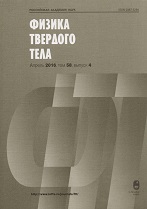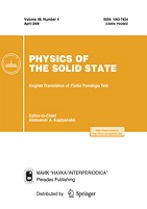|
This article is cited in 2 scientific papers (total in 2 papers)
Semiconductors
Effect of porosity on the thermoelectric efficiency of PbTe
L. P. Bulata, D. A. Pshenay-Severinbc, V. B. Osvenskiid
a St. Petersburg National Research University of Information Technologies, Mechanics and Optics
b Peter the Great St. Petersburg Polytechnic University
c Ioffe Institute, St. Petersburg
d JSC "Giredmet" SRC RF, the Federal State Research and Design Institute of Rare Metal Industry, Moscow, Russia
Abstract:
The effect of electron and phonon scattering on nanometer-sized pores on the thermoelectric properties of lead telluride has been studied theoretically. Estimations show that the thermoelectric efficiency can increase by 20–25% at room temperature and by 5–10% at 600 K at the optimal pore size of several nanometers and the porosity of $\sim$10%. An analysis shows that the increase in the thermoelectric efficiency due to additional scattering in the porous material is related to the decrease in the thermal conductivity of the lattice and the increase in the thermoelectric coefficient due to the change in the energy dependence of the relaxation time. To estimate the multiple scattering at high pore concentration, the lattice thermal conductivity by the molecular-dynamics method and the electron free paths in a coherent potential approximation were calculated. It is shown that the inclusion of the multiple scattering slightly influences the thermoelectric properties at noted sizes and pore concentrations.
Received: 03.02.2016
Citation:
L. P. Bulat, D. A. Pshenay-Severin, V. B. Osvenskii, “Effect of porosity on the thermoelectric efficiency of PbTe”, Fizika Tverdogo Tela, 58:8 (2016), 1483–1489; Phys. Solid State, 58:8 (2016), 1532–1538
Linking options:
https://www.mathnet.ru/eng/ftt9878 https://www.mathnet.ru/eng/ftt/v58/i8/p1483
|


| Statistics & downloads: |
| Abstract page: | 107 | | Full-text PDF : | 49 |
|





 Contact us:
Contact us: Terms of Use
Terms of Use
 Registration to the website
Registration to the website Logotypes
Logotypes








 Citation in format
Citation in format 
